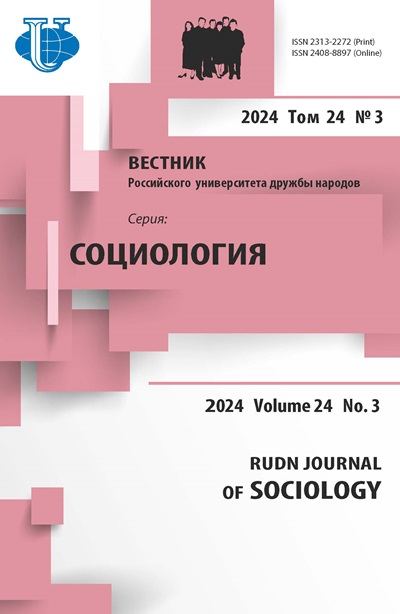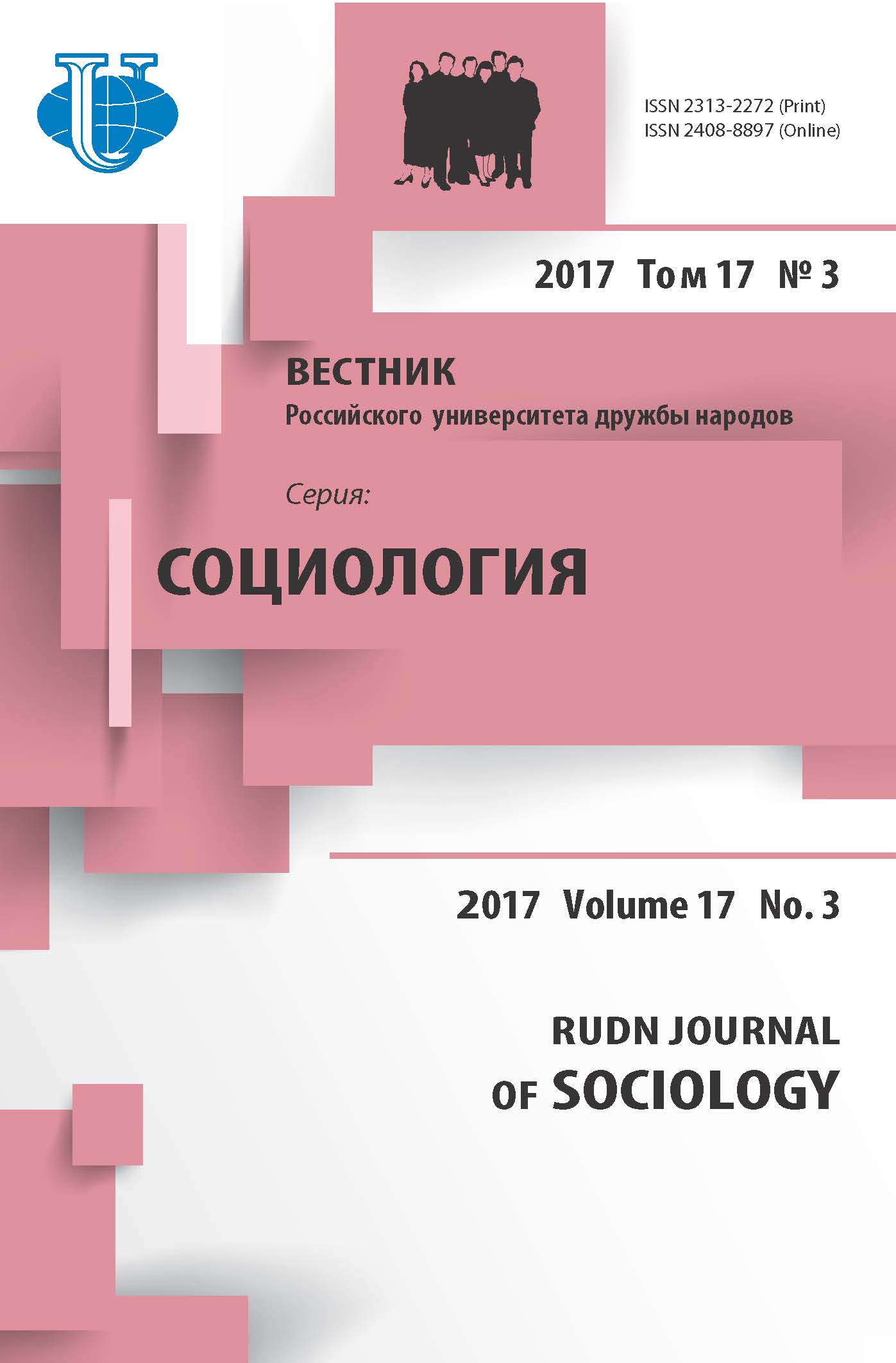ETHNIC STEREOTYPES IN INTERCULTURAL COMMUNICATION: THE UDMURTS’ STRATEGIES
- Authors: Pozdeev IL1
-
Affiliations:
- Udmurt Institute of History, Language and Literature Ural Branch of Russian Academy of Sciences
- Issue: Vol 17, No 3 (2017)
- Pages: 327-337
- Section: Surveys, experiments, case studies
- URL: https://journals.rudn.ru/sociology/article/view/16805
- DOI: https://doi.org/10.22363/2313-2272-2017-17-3-327-337
Cite item
Full Text
Abstract
Based on the data of sociological research the article examines the influence of ethnic stereo-types on the choice of intercultural interaction strategies. The example of the Udmurt ethnos proves the importance of behavioral stereotypes as a program of interpersonal relations and a reference point in interac-tion with representatives of one’s own and other ethnic groups. The author identifies autostereotypes that reflect the emotional perception of ethnic identity and allow predicting further ways of ethnic development. Ethnic stereotypes of the Udmurts were determined by the influence of their cultural environment and adaptation to the social reality. The majority of Udmurts positively perceive their ethnic identity and recog-nize the uniqueness of ethnic culture and the need for positive interaction with other peoples, which explains the author’s cautious optimism when considering the future of the Udmurts. Their historical interaction with the cultural environment had various consequences: on the one hand, it explains the negative self-esteem of the ethnos including self-doubt; and uncertainty often leads to isolation and fear to show one’s cultural identity, and striving for social mimicry. Thus, the author considers the low social status of the Udmurts and their weak adaptive abilities as one of the key factors in strengthening the assimilation. On the other hand, the Udmurts opposition to the cultural domination of other ethnic groups makes them take an active stance and to seek ways to preserve their ethnic identity. Thus, the Udmurts of the Republic of Tatarstan should be as active as the ethnic majority of the region (the Tatars) in the search for new strategies of intercultural interaction and adaption to the social reality. The field ethnographic data allow the author to supplement statistical data with new facts, and help the readers to ‘hear’ the voices of the people and to ‘see’ their emotional perception of social and cultural realities.
About the authors
I L Pozdeev
Udmurt Institute of History, Language and Literature Ural Branch of Russian Academy of Sciences
Author for correspondence.
Email: pozdeev79@gmail.com
Lomonosova St., 4, Izhevsk, 426000, Russia
References
- Baiburin A.K. Etnicheskie aspekty izucheniya stereotipnykh form povedeniya i traditsionnykh kul'tur [Ethnic aspects of the study of stereotypic forms of behavior and traditional cultures]. Sovetskaya etnografiya. 1985;(2). (In Russ).
- Bromley Y.V. K voprosu o vliyanii osobennostei kul'turnoi sredy na psikhiku [On the influence of the features of the cultural environment on the psyche]. Sovetskaya etnografiya. 1983;(3). (In Russ).
- Bromley Y.V. Ocherki teorii etnosa [Essays on the Theory of Ethnos]. Moscow: Nauka; 1983. (In Russ).
- Vasina T.A., Pozdeev I.L. Adaptatsionnye resursy i praktiki gorodskikh udmurtov [Adaptation resources and practices of urban Udmurts]. RUDN Journal of Sociology. 2011;(3). (In Russ).
- Drobizheva L.M. Sotsial'nye problemy mezhnatsional'nykh otnoshenii v postsovetskoi Rossii [Social Problems of Interethnic Relations in Post-Soviet Russia]. Moscow: Tsentr obshchechelo¬vecheskikh tsennostei; 2003. (In Russ).
- Kasimova D.G. Chislennost' i rasselenie tatar Udmurtii [The number and resettlement of Tatars of Udmurtia]. Udmurtskaya Respublika: istoriko-etnograficheskie ocherki. Izhevsk, 2012. (In Russ).
- Nauchno-otraslevoj arhiv Udmurtskogo instituta istorii, jazyka i literatury UrO RAN [Research and Industry archive of the Udmurt Institute of History, Language and Literature of the Ural Branch of the Russian Academy of Sciences]. Rukopisnyj fond. Opis' 2-N, Delo 1637. (In Russ).
- Nauchno-otraslevoj arhiv Udmurtskogo instituta istorii, jazyka i literatury UrO RAN [Research and Industry archive of the Udmurt Institute of History, Language and Literature of the Ural Branch of the Russian Academy of Sciences]. Rukopisnyj fond. Opis' 2-N, Delo 1648. (In Russ).
- Nikitina G.A. Udmurty za predelami Udmurtii: resursy vyzhivaniya v usloviyakh postsovetskikh transformatsii [Udmurts outside Udmurtia: Resources of survival under the post-Soviet transfor¬mations]. Diaspory Uralo-Povolzh'ya. Mezhregional'naya nauchno-prakticheskaya konferentsiа. Izhevsk, 2005. (In Russ).
- Onosov A.A., Gasparishvili A.T. Etnizatsiya massovogo soznaniya russkikh v moskovskom regione: ekspertnaya otsenka protsessa [Ethnization of the mass consciousness of the Russians in the Moscow Region: An expert assessment of the process]. RUDN Journal of Sociology. 2016,16(3). (In Russ).
- Pozdeev I.L., Arzamazov A.A. Uzbeki v Rossii: praktiki adaptatsii v inokul'turnoi srede [Uzbeks in Russia: Practices of adaptation in a foreign language environment]. RUDN Journal of Sociology. 2015,15(4). (In Russ).
- Rybakov S.E. O metodologii issledovaniya etnicheskikh fenomenov [On the methodology of the study of ethnic phenomena]. Etnograficheskoe obozrenie. 2000,(5). (In Russ).
- Udmurtskii fol'klor: Poslovitsy, aforizmy i pogovorki [Udmurt Folklore: Proverbs, Aphorisms and Sayings]. Ustinov: Udmurtiya; 1987. (In Russ).
- Shklyaev G.K. Traditsii i novatsii v mezhetnicheskom povedenii udmurtov [Traditions and innovations in the interethnic behavior of Udmurts]. Traditsionnoe povedenie i obshchenie udmurtov. Izhevsk, 1992. (In Russ).














